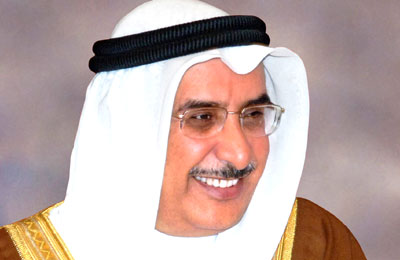
Shaikh Khalid bin Abdulla Al Khalifa
Gulf Air cuts overall losses by 50pc in Q1
Manama, April 24, 2013
Gulf Air, the national carrier of Bahrain, reduced its overall losses by approximately 50 per cent in the first quarter of 2013 compared to the same period last year, realised principally through a 21 per cent fall in year-on-year expenditure.
This was driven by reductions in aircraft leasing fees, flight-related charges and staff expenses in addition to the closure of loss-making routes, said a statement from the national carrier.
The airline is currently three months into a restructuring strategy driven by Gulf Air’s Board of Directors, led by its chairman Shaikh Khalid bin Abdulla Al Khalifa, the Deputy Prime Minister, and implemented by the airline’s management team.
Further, consistent with the restructuring plan that was presented to the Members of Parliament in November 2012, for the first quarter of 2013 the airline performed 11 per cent better than forecast. This positive variance was due in large part to a top-line revenue performance that better than planned, realised through network refinement and the aggressive implementation of a series of commercial initiatives, according to the statement.
Gulf Air’s passenger yield was 21 per cent higher compared to the first quarter of 2012. The increase coincides with the successful realignment of the airline’s network and fleet, a stronger traffic demand in the region and significantly higher sales in Bahrain.
On the cargo front, in line with the modest improvement in airfreight globally, Gulf Air Falcon Cargo freight recorded a 3 per cent increase in revenue against first quarter plan.
The national carrier has completed its network realignment strengthening its Mena operations while maintaining strategic links to select points in Europe, the Far East, India and Pakistan.
With a focus on high-demand and high-yield point-to-point routes that connect Bahraini businesses with regional markets, Gulf Air continues to differentiate itself from its regional competitors and carve a long-term niche in a highly competitive business environment.
The airline continues to hold a leadership position in the Middle East by operating one of the largest regional networks.
In a move to meet the requirements of its realigned network, the airline has been engaged in exhaustive negotiations with its lessors to return surplus aircraft. Gulf Air now operates a mixed wide and narrow body all Airbus fleet consisting of 26 aircraft.
Using predominantly new aircraft with high specification on-board products, the airline’s fleet is one of the youngest in the region with an average aircraft age of just 4.7 years.
An important factor for customers, punctuality is a key performance indicator of the restructuring strategy, while improving efficiency across the organisation is another, said Shaikh Khalid bin Abdulla Al Khalifa.
"In the coming nine months the operating environment will continue to be challenging, however, Gulf Air's board management team is committed to continuing the implementation of the restructuring strategy," he noted.
"Through process and productivity improvements and procurement savings across the business, the national carrier will continue to reduce expenditure while transforming into a more dynamic and efficient airline.
"Gulf Air will continue to explore potential commercial opportunities across its existing route network," he said.
"Recognising additional capacity opportunities across the region the airline's management team has initiated discussions with various civil aviation authorities to request additional frequencies.
"Gulf Air will also continue to invest in upgrading its products. A retrofit of four A330 aircraft used primarily on London and Bangkok to introduce fully flatbed seats in Falcon Gold class, revamp Economy class and upgrade the in-flight entertainment system, is expected to be completed before the end of summer 2014.
"Gulf Air is on a firm footing, yet tough decisions and challenges remain, to achieve the strategic goals and objectives of its 2013 restructuring plan" he said.
"With the continued development of synergies between the national carrier's key stakeholders - the Bahrain Civil Aviation Authority, Bahrain Airport Company, Bahrain Airport Services, Bapco and the government among others, Gulf Air is on track to strengthen its position as a key national infrastructure asset supporting the kingdom's future economic growth and better serving Bahrain and its customers," he added. – TradeArabia News Service







